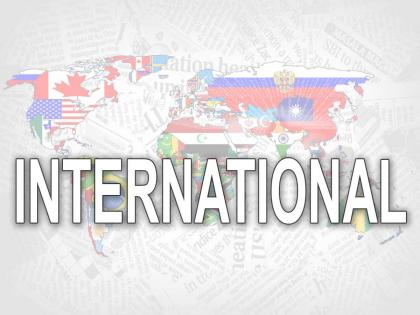Erdogan meets European Council chief over bilateral relations
By IANS | Published: January 12, 2020 07:50 AM2020-01-12T07:50:04+5:302020-01-12T08:00:04+5:30
Turkish President Recep Tayyip Erdogan met with European Council President Charles Michel in Istanbul to discuss the latest developments in the region as well as bilateral relations.

Erdogan meets European Council chief over bilateral relations
The relation between Turkey and the European Union has been stalled over a series of issues topped by Turkey's sending troops to Libya and the drilling activities in the eastern Mediterranean Sea, Xinhua news agency reported on Saturday.
Earlier, Erdogan had announced that his country "gradually" started to send its troops to Libya in line with the deal inked by Ankara and Libya's UN-recognized Government of National Accord (GNA).
Rejecting Turkey's decision on the deployment of Turkish troops, the EU's top diplomats and the foreign ministers of Britain, France, Germany and Italy said at a meeting on Tuesday in Brussel, Belgium, that "continuing outside interference is fueling the crisis" in the country.
Meanwhile, following a meeting in Istanbul on Wednesday, Erdogan and his Russian counterpart Vladimir Putin called on all parties in the North African country for the establishment of an immediate cease-fire, which was later refused by Libya's eastern-based army led by the commander Khalifa Haftar.
Turkey's Foreign Minister Mevlut Cavusoglu on Saturday said Ankara expects Moscow to convince Haftar to comply with the cease-fire call issued by Erdogan and Putin.
Libya has been torn by a raging civil war between the GNA based in the capital Tripoli and the Libyan National Army and its allies based in the east.
Speaking at a joint press conference in Istanbul with Ghana's Minister for Foreign Affairs and Regional Integration Shirley Ayorkor Botchwey, Cavusoglu also accused some regional nations and France of opposing a cease-fire.
Cavusoglu blamed France of causing chaos in Libya, by giving "all kinds of support to a non-legitimate administration, including arms."
"France is looking for any means to sabotage any initiative of which is not part of," he said.
Turkey's agreement with Libya is further expected to protect Turkey's rights in the face of unilateral drilling activities by Greece and Cyprus in the Mediterranean, a move supported by the EU since the gas to be released from the region will be sent to Europe.
Turkey, meanwhile, has been insisting that it "has the right to speak of any project in the region" as it has the longest coastline in the Mediterranean.
( With inputs from IANS )
Open in app